Select Language
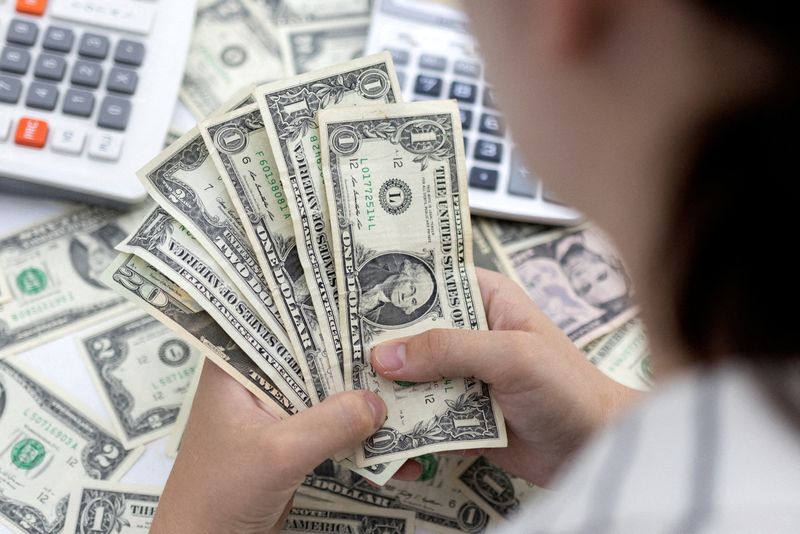
By Rae Wee
SINGAPORE (Reuters) - The dollar came off highs in Asian trade on Monday, but held at elevated levels as Middle East tensions escalated, and investors awaited clues to the outlook for U.S. interest rates from a speech by Federal Reserve Chair Jerome Powell later this week.
The dollar stayed near a one-week high against the euro and sterling as risk sentiment remained fragile.
The euro was last 0.13% higher at $1.05265, having slid to a one-week low of $1.0496 on Friday.
Sterling gained 0.13% to $1.2160, steadying from Friday's one-week low of $1.2123.
The dollar index fell 0.07% to 106.49.
"I view what's going on in Israel as a regional conflict, which typically does not have meaningful impacts on financial markets over time," said David Chao, Invesco's global market strategist for Asia Pacific ex-Japan.
"I don't see it altering growth trajectories of the major economies nor does it make the Fed more hawkish. If anything, I think the Fed is less inclined to tighten going forward given the perception of heightened risks."
Elsewhere, the Israeli shekel slid to a more than an eight-year low of 3.99 per dollar, after the country's Prime Minister Benjamin Netanyahu vowed on Sunday to "demolish Hamas" as his troops prepared to move into the Gaza Strip.
The shekel has fallen more than 3% against the dollar since gunmen from the Palestinian group Hamas rampaged through Israeli towns on Oct. 7.
The yen was last 0.1% stronger at 149.39 per dollar, edging away from the sensitive 150-level. Some traders expect an increased potential for Japanese authorities to intervene to suppot the yen if it weakens past that level.
Carry trades funded by the yen could be the biggest casualty of further escalation in the war, analysts said, as global investors who have for months been shorting the yen to invest in higher-yielding currencies buy it back as a safe-haven.
"Obviously war is inflationary, disrupts growth and threatens risk assets," said James Malcolm, head of FX strategy at UBS in London.
"The largest overhang I can see in this regard is dollar-yen, where the BOJ must pivot regardless and the carry trade that has built up now amounts to nearly half a trillion dollars."
The BOJ has continued to maintain its ultra-easy policy settings although markets are rife with speculation that it could move to gradually exit from the accommodative stance sooner rather than later.
If the BOJ does start its exit, the yen's yield gap against the dollar could narrow, but that depends on what the Fed decides on U.S. rates.
Traders were keenly awaiting Powell's speech before the Economic Club of New York later this week for clues on how much further U.S. interest rates could rise, after data last week showed consumer prices increased more than expected in September.
Markets are largely expecting the Fed to keep rates on hold when it announces its next monetary policy decision in November, according to the CME FedWatch tool, though they see a roughly 32% chance the central bank could deliver a rate hike in December.
In other currencies, the Australian dollar, often used as a proxy for risk appetite, gained 0.45% to $0.63255, after sliding 1.4% last week.
The New Zealand dollar rose 0.65% to $0.5923.
New Zealand's centre-right National Party led by Christopher Luxon will form a new government with its preferred coalition party ACT, as Prime Minister Chris Hipkins conceded his Labour Party could not form a government after Saturday's general election.
"The kiwi dollar jumped... following a clear and decisive victory of New Zealand's opposition National Party," said Kyle Rodda, senior financial market analyst at Capital.com.
"It appears the Nationals are in the position to win power while only requiring one coalition partner, excluding the populist New Zealand First party.
"The kiwi has jumped on the prospect such dysfunction has been avoided."
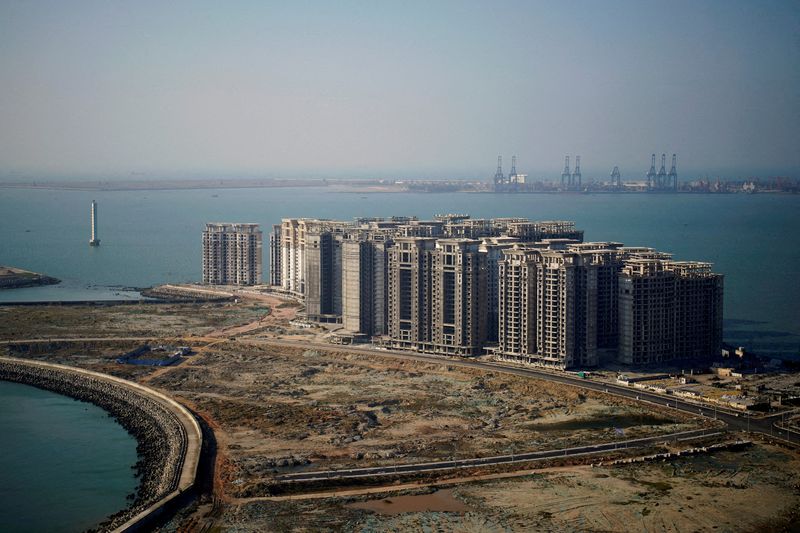
(This Oct. 13 story has been refiled to correct the spelling of Hiroshi Watanabe's name in paragraph 1)
By Leika Kihara
MARRAKECH, Morocco (Reuters) - Hiroshi Watanabe, Japan's former top currency diplomat, recalls how Chinese policymakers eagerly studied ways to avert a Japan-style burst of an asset bubble that led to prolonged deflation and economic stagnation - until around 2015.
"Then they stopped. In the past seven to eight years, they seem to be ignoring everything they learned," said Watanabe, who retains close ties with incumbent policymakers. "Under the Xi administration, China probably shifted its attention away from economics," he told Reuters.
Now, China may be paying the price. Inflation is stalling and its deepening real estate crisis was identified as among the biggest risks to global growth during the International Monetary Fund and World Bank meeting being held in Marrakech Oct. 9-15.
The world's second-largest economy is in the spotlight as a country on the brink of "Japanization," a term describing Japan's 15-year period of low growth and deflation after the burst of an asset-inflated bubble in the late 1990s.
Some Japanese policymakers are voicing concern partly since a prolonged slump in Japan's biggest trading partner will deal a huge blow to their export-reliant economy.
"What's fast emerging is the risk of China slipping into deflation, or the 'Japanization' of its economy," Bank of Japan (BOJ) board member Asahi Noguchi said on Thursday.
"It's not clear yet whether China is heading toward a situation similar to Japan. But it's true China's real estate sector - the backbone of its economy - is slumping, youth job losses are rising and inflation is weakening," he said in Japan.
In its World Economic Outlook, the IMF cut China's growth forecast for this year to 5.0% from 5.2% in April, and warned that its property sector crisis could deepen with global spillovers. It projects growth to slow to 4.2% next year.
Data showed on Friday China's consumer inflation was flat in September, missing forecasts for a 0.2% gain, highlighting the deflationary pressure China faces even as many other countries combat too-high inflation.
Back during its deflationary period from 1998 to 2013, Japan saw core consumer prices fall 0.2% on average, as slumping property prices hit bank balance sheets and cooled investment.
To be sure, there are differences between what is happening in China and the experience of Japan. For one, China's balance sheet stress and debt overhang are contained to the real estate sector, notably among troubled developers and local provinces.
That contrasts with Japan, where slumping property prices left banks nationwide with a huge pile of bad loans, causing a broad-based credit crunch that prolonged the economic downturn.
For now, the IMF does not see a big risk of China sliding into deflation with inflation seen accelerating, backed by a recovery in demand, Krishna Srinivasan, director of the lender's Asia and Pacific Department, told a briefing on Friday.
But he urged Beijing to take measures, such as supporting the restructuring of distressed developers and offering guidance to local provinces, to avoid the troubles from broadening.
"Overall, we believe that China can avoid a prolonged period of sub-par growth with the right policies," Srinivasan said, when asked about the chance of "Japanization" in China.
"The point we're trying to make is that it's important to address the property crisis head on, so that it doesn't become a bigger problem."
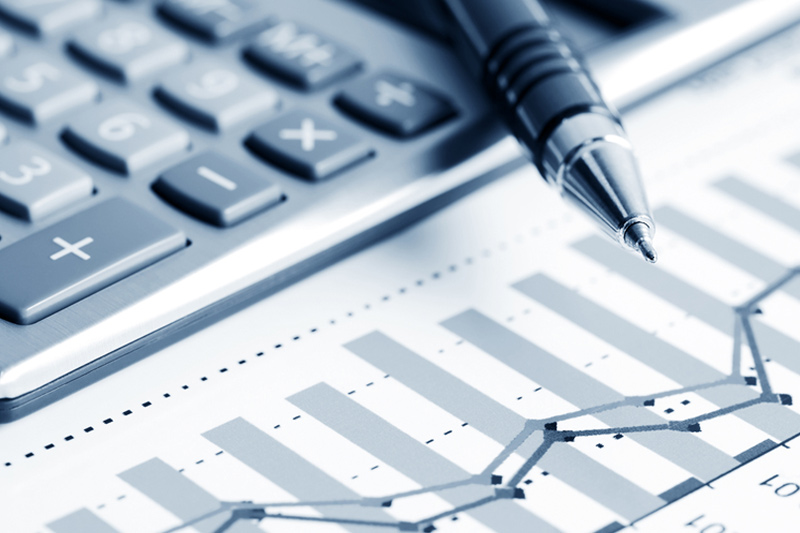
LONDON (Reuters) - Britain and South Korea have agreed to extend a period of low or zero tariffs on bilateral trade by two years, ahead of talks to forge a new trade deal, the British government said on Monday, in a boost for the car industry.
Without the extension, British businesses, such as automakers and food and drink companies, would have faced high tariffs from Jan. 1 on exports of products made using materials from the European Union, under so-called rules of origin, and on products shipped via the EU.
Annual trade between Britain and South Korea is worth 18 billion pounds ($21.9 billion), and the two sides will begin talks later this year on a new trade deal. Their current agreement was rolled over from Britain's membership of the EU.
Britain's minister for international trade, Nigel Huddleston, said extending the tariff-free period would provide welcome certainty for businesses.
"This is fantastic news for UK businesses who can continue selling their fantastic goods with confidence to South Korea," Huddleston said.
South Korea is the seventh-biggest export market for British-made cars and the third-largest supplier of new cars for Britain, meaning any new tariffs "would have been bad for both sides," said Mike Hawes, the head of the British car industry trade body.
"We look forward to the start of negotiations and swift conclusion of a modernised trade deal that delivers more benefits to our respective automotive sectors, in particular boosting trade in EVs and related technologies," Hawes, the Chief Executive of the Society of Motor Manufacturers and Traders, said.
($1 = 0.8237 pounds)
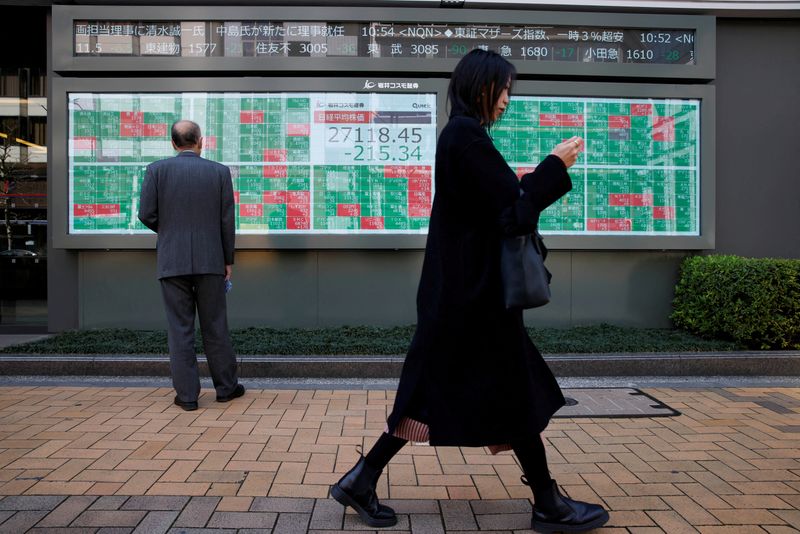
By Kevin Buckland
TOKYO (Reuters) - Crude oil hovered above $90 a barrel while equities were weak and the safe-haven dollar was firm on Monday as investors nervously watched for whether escalating violence in Gaza would cause the conflict to spread beyond Israel and Hamas.
Israel's shekel sank to a nearly eight-year low, after the country's prime minister, Benjamin Netanyahu, vowed to "demolish Hamas" in retaliation for the rampage on Oct. 7 that killed 1,300 people in the worst attack on civilians in Israel's history.
U.S. Secretary of State Antony Blinken is visiting the region, seeking to prevent further escalation. Netanyahu agreed to lift a blockade of water supplies to parts of southern Gaza after speaking with U.S. President Joe Biden.
Brent crude futures reached a new recent high of $91.20 on Monday before easing back slightly to $90.84, following Friday's 5.7% surge.
Japan's Nikkei share average fell more than 1%, while Australia's S&P/ASX 200 index lost 0.15% in early trading. New Zealand's equity benchmark slid 0.9%.
On Friday, the pan-European STOXX 600 index lost 0.98 and New York's S&P 500 declined 0.50%, although U.S. stock futures pointed 0.18% higher on Monday.
"The situation is dynamic and it's too early to say if the hedges placed on Friday are unwarranted, but there have been pockets of positive news flow," Chris Weston, head of research at Pepperstone, wrote in a note, citing the resumption of water supplies as one example.
"Risk and energy markets will look for headlines and actions from Iranian officials who have stated they have a duty to come to the aid of the Palestinians."
Benchmark 10-year U.S. Treasury yields were little changed at 4.6434%, following a more than 8 basis point decline on Friday amid demand for the safety of bonds.
Currencies overall retraced some of their moves from the end of the week, with the U.S. dollar index easing slightly to 106.55 from as high as 106.79 on Friday.
The euro rose 0.1% to $1.0522 while the yen was little changed at 149.505 per dollar.
However, Israel's shekel was weaker, last trading at 3.9850 per dollar after weakening to 3.9900 earlier in the day for the first time since April 2015.
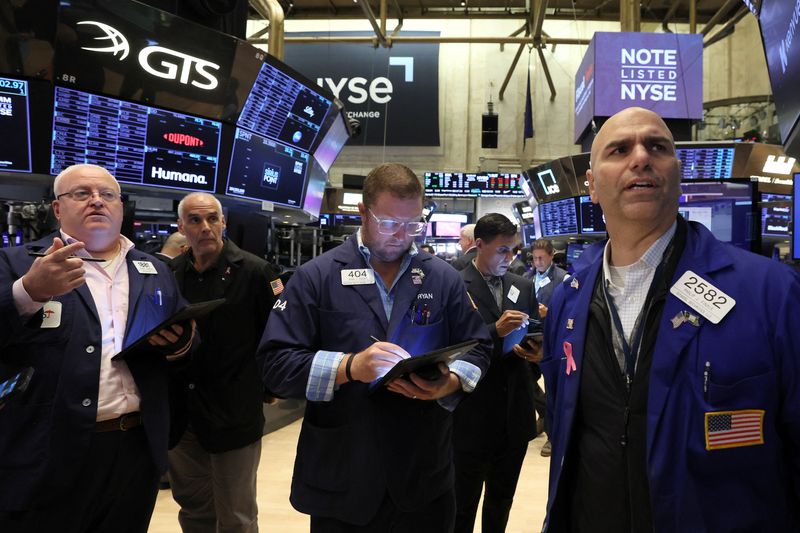
LONDON (Reuters) - Geopolitics are at the forefront of everyone's minds after war broke out between Israel and Palestinian militant group Hamas, and the mood in markets is jittery at best.
Next week might offer some reassurance that both households and businesses are holding up in an uncertain macro environment as some of the world's biggest companies report earnings, and economic data offers a look at growth, wages and consumer spending in the likes of the Unites States, China and Britain.
Here's your week ahead in markets from Kevin Buckland in Tokyo, Lewis Krauskopf in New York, and Naomi Rovnick, Karin Strohecker and Amanda Cooper in London.
1/ EARNINGS HEAT UP
A number of major U.S. companies report results, revving up a third-quarter earnings season expected to show a pickup in profit growth after a tepid first half.
Tesla (NASDAQ:TSLA) kicks off earnings for the megacaps on Oct. 18. These companies' shares have been key drivers of the equity rally in 2023.
Bank of America and Goldman Sachs both report Oct. 17. Other heavy hitters include healthcare giant Johnson & Johnson (NYSE:JNJ) on Oct. 17, Netflix (NASDAQ:NFLX) on Oct. 18 and Philip Morris International (NYSE:PM) on Oct. 19
In economic data, U.S. retail sales for September, due on Tuesday, will provide a key look into the health of the consumer. Investors are keen to determine if the economy can avoid a hard landing. U.S. retail sales increased more than expected in August as a surge in gasoline prices boosted receipts at service stations.
2/ CASTLES OF SAND The clock is ticking loudly for China's biggest private property developer. Country Garden has until Tuesday to meet coupon payments or have all its nearly $11 billion in offshore debt deemed in default. It's not alone. Companies accounting for 40% of Chinese home sales have defaulted since 2021, when a liquidity crisis hit the sector, which accounts for about a quarter of the economy. Beijing has rolled out a raft of measures recently, but with little impact on home sales. There have been reports the government is looking to increase its budget deficit to meet this year's 5% growth target. Recent data already suggests the worst may be over for parts of the economy. Wednesday could bring confirmation, with the release of GDP, industrial output and retail sales figures.
3/ POLES TO THE POLLS
Poles vote for a new government in a high-stakes election on Sunday, following a tight, unpredictable race in central Europe's largest economy. The cost of living and migration are key domestic issues, but the vote will shape Poland's - currently frayed - ties with Brussels, and also be hugely consequential for European elections in summer 2024.
Polls point to a win for the ruling nationalist Law and Justice party (PiS), but to no outright majority, potentially leading to fragile governments, or even a political vacuum, which could bring more pain for the zloty, domestic bonds and the country's stock markets.
The election cycle is also heating up elsewhere in emerging markets, with Ecuadorians voting on Sunday for a new president and Argentinians heading to the polls on Oct. 22.
4/ BANK ON SOME OPTIMISM
Storm clouds are brewing over European banking stocks as the boost from higher interest rates fades and recession risks rise, but some big investors are hanging on to shares.
Banks have long underperformed the region's main stock market. And just ahead of quarterly earnings next week, European bank shares are sporting a dividend yield of almost 8%, making them cheaper on this basis than during the 2008 global financial crisis.
Banks have had a major boost from hiking their loan costs in line with central bank rates.
Analyst forecasts collated by European asset manager Amundi show European banks are expected to grow adjusted earnings by 25% this year, followed by a 6% gain in 2024.
5/ THE OLD LADY'S DILEMMA
Poor Old Lady of Threadneedle Street. The Bank of England (BoE) has been constantly wrongfooted by inflation data for months. For most of the year, it's come in above expectations and well above the central bank's own forecasts. Suddenly in August, it slowed more than expected. Many believe the data pushed the BoE to leave rates unchanged at its last meeting.
That said, inflation is still over three times the BoE's 2% target and growth isn't exactly stellar. Meanwhile, at the last count, the labour market was starting to cool, but basic pay grew at its fastest rate on record - making the BoE's juggling act even tougher.
More surprises on Oct. 17 and 18, when employment and inflation data land, respectively, could set an awkward scene for the BoE's November meeting a little over two weeks later.
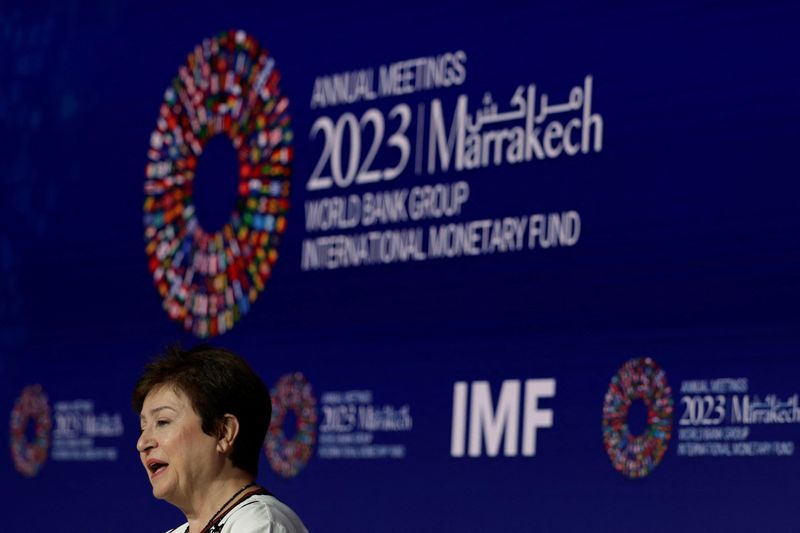
By Andrea Shalal, Rachel Savage and Jorgelina do Rosario
MARRAKECH, Morocco (Reuters) -The International Monetary Fund on Thursday hailed progress on a long-awaited memorandum on Zambia's debt restructuring, and said consensus was growing on thorny issues such as the comparability of treatment of private and public creditors.
IMF Managing Director Kristalina Georgieva told reporters the Group of 20 Common Framework for debt restructuring had been slow to deliver results, but welcomed the acceleration of timelines in recent individual country cases, including Zambia.
News about Zambia's imminent deal with its official creditors emerged during a panel on debt at the annual meetings of the IMF and World Bank.
Zambia Finance Minister Situmbeko Musokotwane, speaking on the same panel as Georgieva, said it has been "embarrassing to find ourselves in debt distress," which forced the country to cancel infrastructure projects it could no longer afford.
Georgieva also said she was more optimistic about the debt restructuring process now than before the creation of the Common Framework, but said more progress was needed.
"We should be concerned, but recognize that we are not at the footsteps of a debt crisis," she said.
Throwing out the Common Framework altogether would put the world in a "much less predictable environment," she told a news conference earlier in the day, adding that creative approaches were also needed, including moves to better align debt restructuring with the climate crisis.
A progress report on the debt restructuring discussions, published Thursday by the IMF, World Bank and India, the G20's current chair, found "significant progress" on actual debt restructuring cases, but said private and public creditors still had differences on the comparability of treatment issue.
"Assessing and enforcing comparability of treatment (CoT) between official bilateral and private creditors remains a divisive issue and no consensus could be reached among all stakeholders," the statement said.
The Global Sovereign Debt Roundtable met on Thursday, bringing together senior finance officials from the United States, China and other G20 countries, along with Zambia and other debtor nations, private sector creditors and the IMF and World Bank for closed-door talks on debt issues.
Zambia became the first African country to default in the COVID-19 pandemic era in 2020 but its restructuring under the G20's Common Framework process was plagued with delays.
It clinched an agreement in June to restructure $6.3 billion in debt owed to governments abroad including China and members of the Paris Club of creditor nations, but a formal memorandum of understanding (MoU) has taken months to complete.
Two sources familiar with the process said the negotiations took time but ultimately yielded a first: detailed language agreed by major creditor China with the Paris Club on how to enforce the comparability of treatment of private and public creditors.
"If indeed a better deal can be reached with the private creditors, then the deal with the official creditors is just off the table," one of the sources said. "That is the first time ever that China and the Paris Club have generated joint rules."
Progress in Zambia's case ould provide a model for subsequent debt restructuring agreements, the sources said.
China has said that its agreement with Zambia is not a blueprint, but the metrics to assess comparability and how to enforce it would create some precedent, the sources said.

By Jonathan Landay
WASHINGTON (Reuters) - The United States must prepare for possible simultaneous wars with Russia and China by expanding its conventional forces, strengthening alliances and enhancing its nuclear weapons modernization program, a congressionally appointed bipartisan panel said on Thursday.
The report from the Strategic Posture Commission comes amid tensions with China over Taiwan and other issues and worsening frictions with Russia over its invasion of Ukraine.
A senior official involved in the report declined to say if the panel's intelligence briefings showed any Chinese and Russian nuclear weapons cooperation.
"We worry ... there may be ultimate coordination between them in some way, which gets us to this two-war construct," the official said on condition of anonymity.
The findings would upend current U.S. national security strategy calling for winning one conflict while deterring another and require huge defense spending increases with uncertain congressional support.
"We do recognize budget realities, but we also believe the nation must make these investments," the Democratic chair, Madelyn Creedon, a former deputy head of the agency that oversees U.S. nuclear weapons, and the vice chair, Jon Kyl, a retired Republican senator, said in the report's preface.
Addressing a briefing held to release the report, Kyl said the president and Congress must "take the case to the American people" that higher defense spending is a small price to pay "to hopefully preclude" a possible nuclear war involving the United States, China and Russia.
The report contrasts with U.S. President Joe Biden's position that the current U.S. nuclear arsenal is sufficient to deter the combined forces of Russia and China.
The arsenal's makeup "still exceeds what is necessary to hold a sufficient number of adversary targets at risk so as to deter enemy nuclear attack," the Arms Control Association advocacy group said in response to the report.
"The United States and its allies must be ready to deter and defeat both adversaries simultaneously," the Strategic Posture Commission said. "The U.S.-led international order and the values it upholds are at risk from the Chinese and Russian authoritarian regimes."
Congress in 2022 created the panel of six Democrats and six Republicans to assess long-term threats to the United States and recommend changes in U.S. conventional and nuclear forces.
The panel accepted a Pentagon forecast that China's rapid nuclear arsenal expansion likely will give it 1,500 nuclear warheads by 2035, confronting the United States with a second major nuclear-armed rival for the first time.
The Chinese and Russian threats will become acute in the 2027-2035 timeframe so "decisions need to be made now in order for the nation to be prepared," said the 145-page report.
The report said the 30-year U.S. nuclear arms modernization program, which began in 2010 and was estimated in 2017 to cost around $400 billion by 2046, must be fully funded to upgrade all warheads, delivery systems and infrastructure on schedule.
Other recommendations included deploying more tactical nuclear weapons in Asia and Europe, developing plans to deploy some or all reserve U.S. nuclear warheads, and production of more B-21 stealth bombers and new Columbia-class nuclear submarines beyond the numbers now planned.
The panel also called for boosting the "size, type, and posture" of U.S. and allied conventional forces. If such measures are not taken, the United States "will likely" have to increase its reliance on nuclear weapons, the report said.

Thursday, October 12, 2023 - U.S. mortgage rates have climbed for the fifth successive week amid market and geopolitical uncertainty, reaching an average of 7.57% for a fixed 30-year mortgage, the highest level since late 2000, according to Sam Khater, Freddie Mac 's chief economist. This marks a 0.08 percentage point increase from last week's average of 7.49%.
Despite robust economic and income growth, significant affordability issues continue to plague the housing market, resulting in a three-decade low in purchase demand. The surge in home prices coupled with escalating mortgage rates has deterred many potential buyers. Yet, those relocating from high-cost areas to more affordable regions remain active participants in the market.
In the context of the current market, Freddie Mac (FMCC (OTC:FMCC)) has shown some interesting financial metrics. According to real-time data from InvestingPro, Freddie Mac has a market cap of 2020M USD, with a P/E ratio of 74.58, indicating a high valuation compared to earnings. The company has also demonstrated a significant return over the last three months, with a 40.23% increase in price. This aligns with an InvestingPro Tip that highlights the company's strong return over the same period.
In addition to this, there has been a notable rise in applications for adjustable-rate mortgages (ARMs), with a 15% application surge last week as buyers seek to decrease their short-term monthly payments amidst rates exceeding 7%. Bob Broeksmit, president of the Mortgage Bankers Association, pointed out that the average interest rate on 5/1 ARMs was at a considerably lower 6.33% last week.
The PMMS survey by Freddie Mac focused on conventional home purchase loans for borrowers who put down 20 percent and have excellent credit. It revealed that the 15-year fixed-rate mortgage (FRM) also increased to an average of 6.89 percent from last week's 6.78 percent.
Lawrence Yun, the National Association of Realtors’ chief economist, expects mortgage rates might reach 8% soon and stay at that level through the end of the year. Freddie Mac continues to promote liquidity, stability, affordability, and equity in the housing market through all economic cycles since 1970. This commitment is reflected in the company's high earnings quality, with free cash flow exceeding net income, as pointed out by another InvestingPro Tip.
Freddie Mac's Chief Economist Sam Khater has been closely monitoring these trends and can provide further insights. Angela Waugaman, a representative of Freddie Mac, is also available for additional information at (703)714-0644 or [email protected]. Freddie Mac maintains a strong presence across various social media platforms.
For more detailed insights and tips on Freddie Mac and other companies, consider checking out InvestingPro's premium service, which includes numerous additional tips for a variety of companies. Find out more at InvestingPro Pricing.
This article was generated with the support of AI and reviewed by an editor. For more information see our T&C.
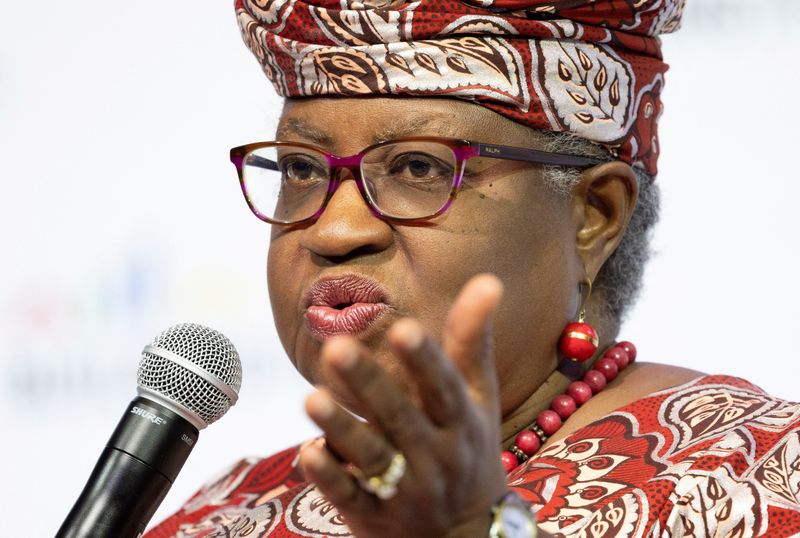
By Andrea Shalal
MARRAKECH, Morocco (Reuters) - World Trade Organization chief Ngozi Okonjo-Iweala said she hoped the Israel-Hamas conflict could be ended quickly, warning it would have a "really big impact" on already weak global trade flows if it widened throughout the region.
Okonjo-Iweala, in Morocco for this week's annual meetings of the International Monetary Fund and World Bank, said Middle East violence could add to factors throttling trade growth, including higher interest rates, a strained Chinese property market and Russia's war in Ukraine.
"We hope this ends soon and it's contained. Our biggest fear is if it widens, because that will then have a really big impact on trade," she said in an interview. "Everybody's on eggshells and hoping for the best."
Okonjo-Iweala said global uncertainty was already limiting growth in trade, but that would be exacerbated by the sudden onset of war between Israel and the Islamist Hamas group that controls the Gaza Strip
"There is uncertainty about whether this is going to spread further to the whole region, which could impact very much on global economic growth," she said. "We hope it will end because it does create this uncertainty. It's another dark cloud on the horizon."
The Geneva-based trade body last week halved its growth forecast for global goods trade this year, citing persistent inflation, higher interest rates, the slowing Chinese economy and the war in Ukraine.
The WTO said merchandise trade volumes would increase by just 0.8% in 2023, compared with its April estimate of 1.7%.
For 2024, it said goods trade growth would be 3.3%, a forecast virtually unchanged from its April estimate of 3.2%.
The 164-member organization repeated its warning that it saw some signs of trade fragmentation linked to global tensions, but no evidence of a broader de-globalization that could threaten its 2024 forecast.
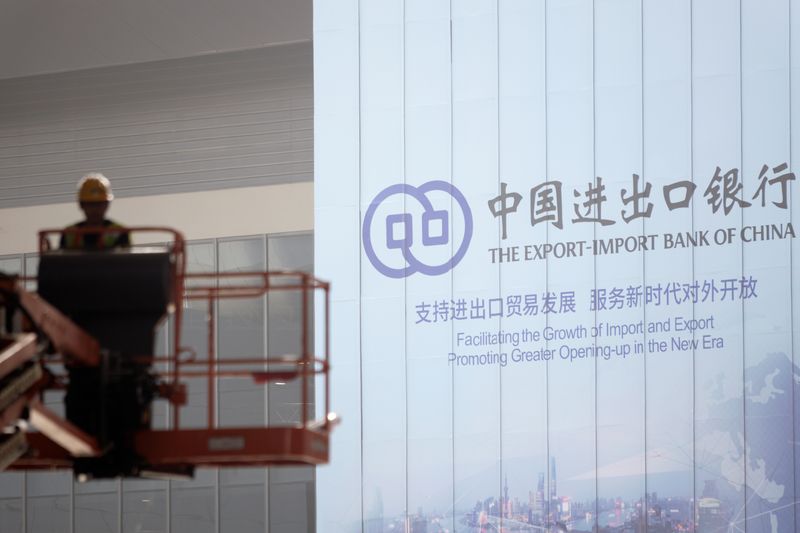
By Uditha Jayasinghe
COLOMBO (Reuters) -Sri Lanka has reached an agreement with the Export-Import Bank of China to cover about $4.2 billion of the island nation's outstanding debt, its finance ministry said in a statement on Thursday.
Sri Lanka is struggling with its worst financial crisis in more than seven decades after its foreign exchange dwindled to record lows, forcing the country to default on its foreign debt last May.
China is Sri Lanka's largest bilateral creditor, owing about $7 billion.
Sri Lanka started negotiating with its bondholders and key bilateral creditors including China, Japan and India last September, parallel to moving forward on a $2.9 billion bailout from the International Monetary Fund (IMF).
The agreement with China EXIM Bank will assist Sri Lanka in getting past the first review of the IMF programme in the coming weeks and in securing the release of the second IMF tranche of about $334 million, the statement said.
"This agreement constitutes a key milestone in Sri Lanka’s ongoing efforts to foster its economic recovery,” the statement added. "In the next few weeks, the Sri Lankan authorities and China EXIM bank will actively work on formalizing and implementing the agreed parameters of the debt treatment."
A debt rework deal between Sri Lanka and countries including Japan, India and France was expected this week. But those countries and the IMF were surprised on Tuesday when Sri Lanka made a deal with China.
Japan, France and India, which are co-chairs of a creditor committee for Sri Lanka, may need to see details of the agreement Sri Lanka has made with China EXIM Bank to proceed with debt restructuring negotiations.

